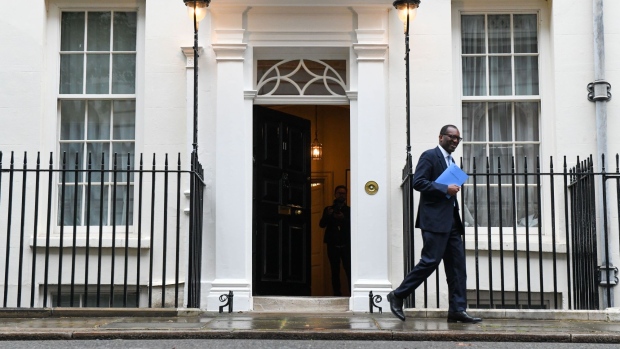Sep 28, 2022
Business Chiefs Criticize UK Chancellor’s Tax Cuts
, Bloomberg News

(Bloomberg) --
Senior business figures have criticized the UK government’s round of tax cuts which triggered a sharp drop in the pound and convinced the Bank of England to intervene amid volatility in the markets.
Mike Rake, a former chairman of BT Group Plc and easyJet Plc, said there was “grave concern that this policy is in danger of further damaging our reputation and our economy.”
Rake was commenting Wednesday morning before the BOE announced that it would buy long-dated government bonds, reversing the previous course on which it was due to start selling bonds -- a process known as quantitative tightening -- next week. It will now postpone those sales.
He added that “people are really unable to understand why” the government and BOE are appearing to pull in different directions.
On Tuesday night the International Monetary Fund said the UK should “re-evaluate the tax measures, especially those that benefit high-income earners.”
Read More: Airline Chiefs Lambast Truss Budget Plan That Sank the Pound
The pound and gilts had nosedived after Kwarteng announced a series of tax cuts in a mini-budget on Friday that was not accompanied by analysis from the Office for Budget Responsibility, the UK’s fiscal watchdog, which normally evaluates chancellors’ full budgets. He said at the weekend that he was inclined to cut taxes even further.
The policy’s proponents argue that tax cuts, alongside a raft of supply-side reforms, can boost the UK’s growth rate.
Martin Sorrell, the founder of WPP Plc who is now chairman of S4 Capital Plc, said Conservative members had made a mistake by electing Liz Truss as prime minister earlier this month, instead of former Chancellor Rishi Sunak.
“Sunak was the adult in the room and forecast all this,” Sorrell told Bloomberg News. “It’s like a CEO and CFO reducing revenues and increasing costs without a plan. In this case, the shareholders will vote in two years, unfortunately.”
Read More: Former Barclays CEO Diamond Says UK Must Restore ‘Credibility’
Three chairmen of major financial companies expressed disbelief about the chancellor’s mini-budget and further promises of more tax cuts.
Kwarteng’s team did little to prepare the market for the sharp rise in government borrowing that was to come and has made matters worse by appearing not to be concerned about the damage that has been done to the pound and the gilts market, they each said, while asking not to be identified to preserve their firms’ relationship with the new government.
The contents of Friday’s announcement and the communication showed naivety, one of the people said. It also reflected a lack of senior experience at the Treasury, after the dismissal of Tom Scholar as permanent secretary and departure of Charles Roxburgh as his deputy, another said.
©2022 Bloomberg L.P.






